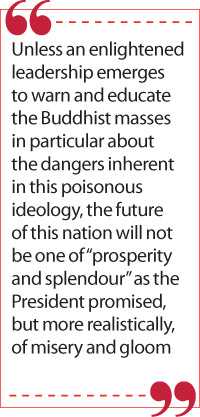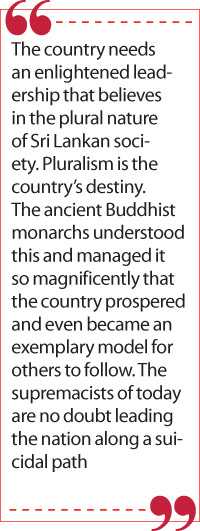Thursday Feb 19, 2026
Thursday Feb 19, 2026
Thursday, 18 March 2021 00:00 - - {{hitsCtrl.values.hits}}
|
Minister of Public Security Sarath Weerasekara
|
Never in the history of Sri Lanka, since the arrival of Muslims circa 8th century, did this entrepreneurial community experience such a stressful period of existence as it is experiencing today.
The community is essentially facing an existential crisis. Politicised Buddhism in bed with Islamophobia has metamorphosed into an anti-Muslim ideology especially since 2009, that it has no tolerance for anything that is Islamic or Muslim in this country.
The One-Country-One-Law (OCOL) slogan is that ideology’s newly-discovered propaganda weapon to mislead the Sinhala Buddhists, trap power-hungry politicians, and confront and eliminate eventually all socio-economic, cultural and political phenomena that bear any Islamic or Muslim semblance.
Buddhist supremacists, married to this ideology, are on an ethnic cleansing mission. This is the reason why Muslims are facing an existentialist crisis today, after living cheek-by-jowl with Buddhists, Christians, Hindus and other religious and non-religious groups for more than a millennium.
Unless an enlightened leadership emerges to warn and educate the Buddhist masses in particular about the dangers inherent in this poisonous ideology, the future of this nation will not be one of “prosperity and splendour” as the President promised, but more realistically, of misery and gloom. 
Objectives of latest set of measures
The latest set of measures announced by Minister of Public Security Sarath Weerasekara, in the wake of the report of the Presidential Commission of Inquiry (PCoI), and which is yet to be released to the public in its entirety, are intended to accomplish at least three objectives.
Firstly, those measures would go to some extent to appease the supremacists and satisfy their Islamophobic appetite so that they would continue to back the ruling regime.
Secondly, by picking only those recommendations that deal with the philosophy, objectives and methodology of the killers and their supportive organisations, by ignoring those recommendations that call for the ban on extremist Buddhist groups like Bodu Bala Sena (BBS), and by recommending some ill-thought out preventive measures such as the banning of burqa and madrasas, the regime shows no interest in the larger question of bringing to justice those who masterminded the Easter massacre, and funded and facilitated the operation.
The entire Kattankudy and those who knew Zahran personally would vouch for the fact that he was absolutely incapable of planning and executing such a complex operation, even though he had the motive. The Government’s lackadaisical approach to this vital question has obviously angered the Catholic Church and the Archbishop has every reason to argue that the report is incomplete and he may even go international and plead for justice.
And thirdly, by focusing on Muslims, the regime is trying to deflect the rising criticism and opposition against its own failure to deliver what it promised to the people before coming to power.
The economy is contracting, country is facing financial bankruptcy, households are finding it extremely hard to make both ends meet, foreign relations are in shamble and uncoordinated and ad hoc infrastructural development has destroyed the nation’s ecological balance. It is to hide these facts from the public and divert its attack on the regime, Muslims have become the scapegoats.
Burqa and niqab ban
What will the proposed measures by the Minister achieve? Consider the issue of banning burqa and niqab, which is yet to be approved by the Cabinet. If those two pieces of female attire is a security threat, then the yellow robe of a Buddhist monk should have been banned in 1957, because it was a monk, Somarama Thera, who concealed his gun under that robe and assassinated Prime Minister Bandaranaike. Today’s weapons of mass destruction are produced in so many shapes and sizes that they don’t need a burqa or niqab to hide them.
However, these two pieces of cloth are novelties introduced only after 1980 as a result of the ‘Black Wave’ that spread to many parts of the Muslim world after the Islamised Revolution of Iran in 1979. They are alien to the cultural climate of multicultural Sri Lanka. Yet, it is an individual’s choice and wearers may argue quite rightly that is their human right that has been invaded by this ban. That argument must be confronted and defeated.
Although an individual has a right to wear what he or she wants, that individual is a member of a society, which is multicultural in Sri Lanka. Humans are social animals. If what I wear becomes a hindrance to my social relations and keep me isolated, then I am forced to choose between my dress and preference for isolation. This is the dilemma the Muslim community faced when these novelties entered the community decades ago.
Does Islam encourage social isolation of Muslims? In other words, does Islam promote self-alienation? Had Muslim leadership at that time initiated a dialogue with the community on these questions and educated the fashion seekers the community could have avoided the ban by Government today. At least this writer raised that issue almost 20 years ago.
The failure of leadership has created numerous problems to Muslims and female attire is one of them. The Minister should withdraw his proposal and encourage the community to solve it from within.
Abolishing Quranic schools
Similarly, is his decision to abolish over 1,000 elementary Quranic schools that teaches the kids nothing more than to read the Holy text in Arabic, and memorise certain essential recitations required for performing the obligatory duties in Islam.
If that part of teaching is considered by the Minister as fundamentalism and extremism, then the Minister’s cerebral capacity should be re-examined. He seems to have a confused notion about madrasas.
Madrasas are all not of the same category. It is true that even the more structurally modern and prestigious ones in Sri Lanka need reforms in their curriculum and methods of teaching. Sri Lanka does not need foreigners to come and teach in their madrasas. There is an adequate number of local scholars who could perform even a better job than foreigners who come from a mono-cultural environment. But, once again these are internal matters to be left to the community.
What the Minister’s highhanded approach would accomplish will be to start parents to impart Quranic teaching to their kids at home with private tutors. Many tutors would obviously volunteer to teach freely and expect to be rewarded in the hereafter. The Minister should understand that Muslims under no circumstances would sacrifice Quranic education.
 Rehabilitation centres
Rehabilitation centres
The most dangerous of the Government measures is to open rehabilitation centres to brainwash those the authorities would consider extremists, fundamentalists and terrorists. One is not sure whether the Minister concerned understands the difference among these groups.
Leaving that aside, the idea of ‘moulding’ the Muslims was first put forward soon after that public rally organised in Kandy by BBS Secretary Galagoda Aththe Gnanasara on 7 June 2019. He was obviously modelling his plan on China’s experiment with Uyghurs.
The Government, which is not going to ban the BBS, as publicly announced by the Minister of Education Professor G.L. Pieris, is making Gnanasara’s wish a reality. Accordingly, the security forces could arrest any Muslim under any pretext, deem that person an extremist, fundamentalist or terrorist and throw him or her inside that camp. When they come out alive after a few years will they remain a Muslim? The Government following its ‘predator friend’ China is engaging in institutional brain washing.
The country needs an enlightened leadership that believes in the plural nature of Sri Lankan society. Pluralism is the country’s destiny. The ancient Buddhist monarchs understood this and managed it so magnificently that the country prospered and even became an exemplary model for others to follow. The supremacists of today are no doubt leading the nation along a suicidal path.
The anti-Muslim measures and their anti-minority stance are under international watch. We hope the UNHCR Council resolution would send a clear message to the rulers that they would be made accountable and cannot shelve their crime against minorities under the domestic matter cupboard.
(The writer is attached to the School of Business & Governance, Murdoch University, Western Australia.)